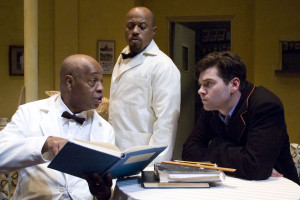
"Master Harold"...and the Boys
Jan 20, 2010 - Mar 21, 2010
Read MoreHarold athol Lanigan Fugard was born June 11, 1932, in the Karoo village of Middleburg, Cape Province, South Africa. Fugard attended the University of Cape Town for two years, studying philosophy before dropping out to travel across Africa. He then served on the merchant ship the SS Graigaur, and sailed the trade routes of southeast Asia. Upon returning to Port Elizabeth, he worked as a freelance journalist for the Evening Post. In 1956, he married actress Sheila Meiring (now a novelist and poet), with whom he founded cape town’s Circle Players, a theater workshop where his first play, KAAS AND THE DEVIL, premiered.
In 1958, Fugard was a clerk in the Native Commissioner’s Court in Fordsburg, the“pass law” court (a court where black africans were taken when they were in violation of the pass laws that regulated their movement in urban areas). there he learned of the injustices of apartheid.
Due to the political persecution in apartheid South Africa, he and his wife moved to London where Fugard penned THE BLOOD KNOT (1961). Upon returning to South Africa later that year, Fugard found that THE BLOOD KNOT, because of its interracial content, would not be permitted to play there after its first perfor- mance at the dorkay House in Johannesburg, starring Fugard and south african actor Zakes Mokae. in late 1961, he took the production to un-segregated London.
Fugard and his family returned to South Africa in 1967. When the english television network BBc broadcast a new version of THE BLOOD KNOT, that year, the government seized his passport for four years and kept him and his family under surveillance, which included opening their mail and tap-ping the phone line. it would not be until 1971 that Fugard was permitted to leave the country; he directed his Obie award-winning BOESMAN AND LENA at London’s Royal Court Theatre.
During the 1960s and ‘70s in South Africa, when inter-racial mixing was illegal, Fugard worked as an actor, director and playwright with cape town’s interracial theater group, The Serpent Players. it was with the Serpent Players that Fugard met Mokae, the black musician and actor with whom he would collaborate throughout his career. through the company, Fu-gard also met John Kani and Winston Ntshona, actors who helped create some of Fugard’s most well-known plays and characters. Fugard’s work during his career, especially with The Serpent Players, the Market theatre, and theaters in London and the United states, has primarily focused on anti-apartheid themes.
There are six play categories to which Fugard’s work can be ascribed: the Port Elizabeth plays, the township plays, exile plays, statements, My africa plays, and sorrows. The plays set in Port Elizabeth (roughly 1961- 1982) depict the familial and personal struggles caused by apartheid. Fugard’s statement plays (1972) directly attack apartheid. And as apartheid was ending in the late 1980s and early 1990s, Fugard’s My africa plays confront the new challenges that face post-apartheid South Africa.